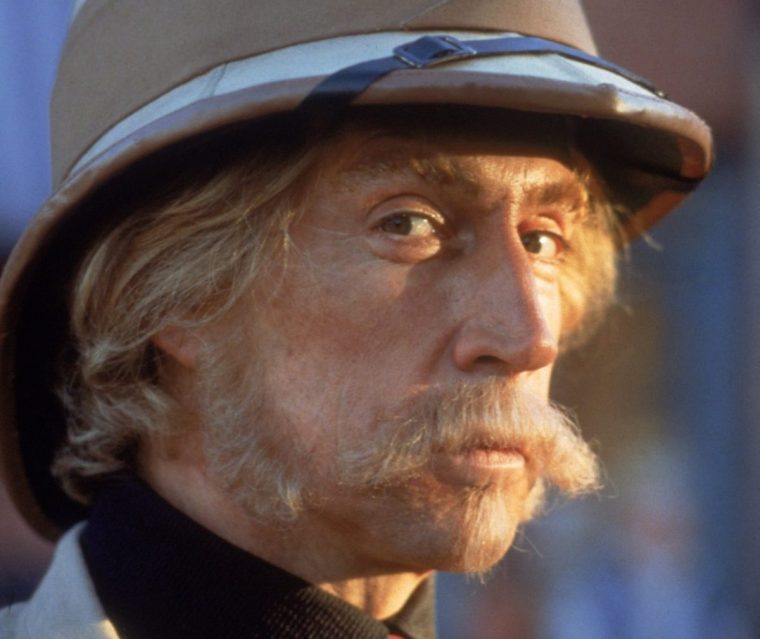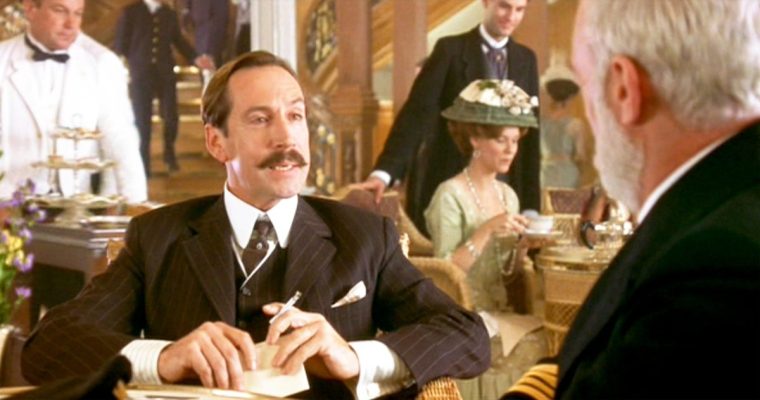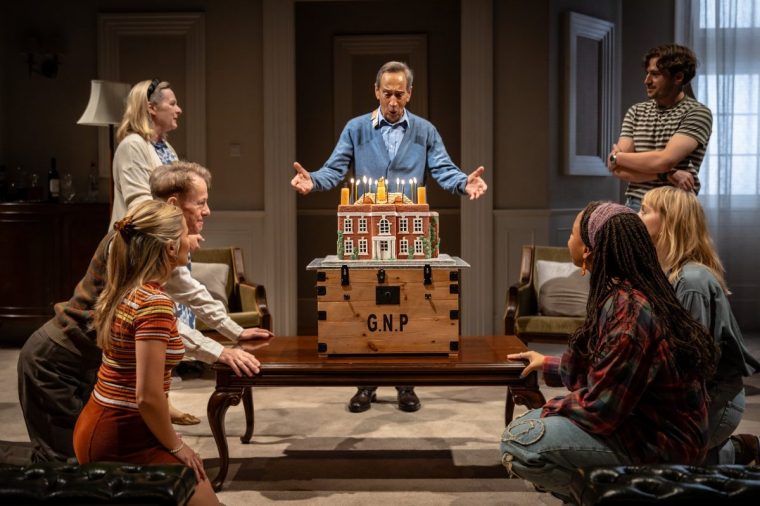“Could I please shoot a monkey?” begged Jonathan Hyde on the set of 1995’s Jumanji. The Australian actor found it implausible that his character – the handlebar-moustached hunter Van Pelt, the villain of a supernatural board game – was expected to chase Robin Williams through the entire movie, narrowing a merciless eye over the barrel of his rifle, without killing anything. “I mean, he was meant to be this fearsome big game hunter. But he kept missing every target. I thought it would be fun if they’d allowed him to blast away at the monkeys he found in the fridge,” he chuckles. “But they were all so affronted. It was meant to be family friendly. They said, ‘You CANNOT shoot a monkey!’”
Now 77, the genial Hyde has built a long career — on stage, screen and TV – playing a full gamut of villains. From the more comical baddies like Captain Hook, through Julius Caesar’s conflicted Brutus (both on stage), to the arrogant and cowardly White Star Line manager J Bruce Ismay in the 1997 blockbuster Titanic. This month he’s back on bullying form as retired QC William Pennington in the Park Theatre’s revival of The Gathered Leaves, by Andrew Keatley.
It’s a knotty family drama in which Hyde’s domineering patriarch attempts to spend a long weekend with his children and grandchildren, including the daughter he drove away for having an illegitimate child with a black man. Although the games the Pennington family play – Uno, Backgammon and Trivial Pursuit – may not summon the magical threats of Jumanji, they stir a more relatable toxic stew of intergenerational rivalries. “These board games all flow on stage in hideous succession,” says Hyde. “They’re incredibly competitive. It’s outrageous. Ferociously funny then moving.”

Talking via video call from the London home he shares with his wife, retired Scottish soprano Isobel Buchanan, Hyde puts the casting “as nasties” down to his face. “I think I’ve got quite a mephistophelean countenance,” he mulls. But I think it’s more about his voice – a deep, posh, penetrating purr that gets right into your bones. No wonder he made his name in cinema playing the hypnotist butler to Macaulay Culkin’s billionaire kid in 1994’s Richie Rich, later translating the hieroglyphics in The Mummy (1999) with spine-tingling authority. It’s a weirdly aspic-chilled British accent for a man born and raised in Brisbane, Australia. Did he pick it up at Rada?
“No,” smiles Hyde. “If I inherited anything from my father, it’s the timbre of my voice.” The actor comes from a long line of upper-middle-class solicitors and judges, with “some recognisable traits I can link straight to the character of [The Gathered Leaves‘] William Pennington. My father’s cri de coeur was always, ‘Why do you DO IT, boy?’ I’d always reply, ‘Because it’s fun, dad.’ In this play, my character’s son is saying, ‘Why do you do it?’ It’s a reversal. A weird echo.”
Hyde’s father, he tells me, was born in 1905. “He fought in the war. To his credit, he was a very gentle man, but dictatorial.” Hyde was raised with an inflexible code of status-conscious etiquette. “You dress like this, behave like that. You cannot go into town in football socks – you must change! You cannot go to lunch with our friends in those trousers. To which I would say: ‘Then I can’t go to lunch!’” He chuckles, then his face sags a little. “But I was sent away to boarding school aged seven and my father lost some control. At that point you become a creature of a different kind of institution…”
That school was the private, Anglican Geelong Grammar School, attended just under two decades earlier by media magnate Rupert Murdoch. Hyde’s sister – 17 years his senior – would go on to marry a Murdoch, a second cousin of Rupert. I can’t help asking if Hyde’s access to the nonagenarian tycoon inspired his role as Eldritch Palmer (a sinister elderly billionaire driven to obtain immortality) in Guillermo del Toro’s FX horror drama, The Strain (2014-2017), but he laughs that off. “Rupert and I shared a school. He funded Titanic and I was in it. I saw him once in a restaurant in Los Angeles. But that’s it. We haven’t had very much in common, frankly.”

He stresses that his sister’s late husband, Keith Murdoch, was “actually a very principled journalist”. But he also chuckles to admit that it is his sister, as much as his father, “to whom I owe my snootiness”. Now 95, and “still barrelling on over in Australia”, his sister was a powerful creative influence on his youth. “She was terribly stylish,” he recalls. “She refused to become a housewife trapped in the Brisbane suburbs. Instead she opened a kitchen shop and travelled around the world to buy her wares. She went to Mexico, the South of France, and bought beautiful terracotta ware and cast iron casserole dishes. Her friends were artists and gallery owners.”
Although Hyde’s father assumed he’d take his place in the family’s solicitor’s firm, the young Aussie’s eyes “rolled back in my head at the thought of torts”. He chuckles. “Dad offered – as an incentive to go into law – a membership to the Royal Queensland Golf Club. I hate golf so that was counterproductive.” He flew off to study in England and join the RSC. “I did later get to play a great lawyer,” he says. In the 1989 ITV drama Shadow of the Noose, he starred as celebrated barrister Edward Marshall Hall. “I told my dad: ‘There you go! There’s your lawyer. We’ve dramatised eight of the most famous cases in British legal history – that’s the best I can do.’”
As William Pennington, Hyde’s on similar turf – although the fictional barrister is losing a once forensic mind to dementia (Hyde himself “keeps the grey cells lined up by performing a new play each year, when possible”). The Gathered Leaves is set in 1997, at the dawn of New Labour. “New Labour, oh God!” exclaims the actor. “Do you remember Tony [Blair] and his crew running to meetings. You thought: ‘That’s energy plus.’ It was sending out the right kind of signal…” He lets out a sigh, recalling the hope he felt “after the nightmare of Thatcher. She started to wreck this country. We hoped Blair would fix that.” He’s nostalgic for a time when he thought New Labour might build alliances between big business and government. “But now we have transactional minds, like Trump, running the world and we realise that the politicians and the corporates are all in it together.”

Hyde shakes his head at the erosion of British infrastructure caused by privatisation. As a lifelong wild swimmer, he’s angry about the state of the UK’s rivers. “When we lived in Bath,” he says, “I used to swim from Dundas Aqueduct all along the Avon to Warley Weir. It’s about two-and-a-half miles. Never saw a soul unless the train went past.”
He builds up a head of steam over the lack of long-term planning. “When did these water companies last build a reservoir? Britain is going dry. You think: ‘Hasn’t anybody examined the upcoming nightmare of climate change?’ The value of government is anticipation. You don’t deal just with the present – you should listen to what your advisors are telling you about how our situation is likely to evolve. Ergo: let’s have some reservoirs. It seems so straightforward…”
The Gathered Leaves, Hyde says, features an autistic character who “cuts through much of the family tension with beautiful honesty. I don’t want to cry, but…” He surprises me by tearing up and explains that the drama is tense with “a lot of restrained emotion, which is harder to play than letting it all flow”. He collects himself. “It’s a passion play,” he explains. “It’s set over the Easter weekend, beginning with a series of crises on Good Friday and moving towards some sense of redemption on Easter Monday.” So although we first meet William as “a fortress of hostility and unpleasantness, the drama opens him out, explains him a little.”
Hyde tilts his head in sympathy. “He turns out to be less horrific than he first appears. It’s quite the journey.”
‘The Gathered Leaves’ is at The Park Theatre, London, until 20 September (parktheatre.co.uk)
